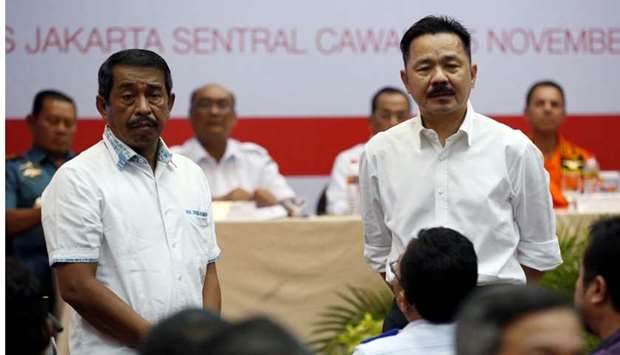Indonesia is to launch a "special audit" of Lion Air's operations in the wake of last week's deadly crash that killed 189 people, the government said Monday.
The budget carrier has been a regular target of complaints about poor service, unreliable scheduling and safety issues, including a fatal 2004 crash.
That safety record has been under the microscope since a new Boeing 737-Max 8 plunged into the Java Sea just 12 minutes after taking off from Jakarta last Monday.
"We will...conduct a special audit of the crews' qualifications and staff communication," transportation minister Budi Karya Sumadi told reporters Monday.
"This is a preventative measure...(The accident) is a very expensive lesson for us."
Civil Aviation authorities in the United States and Europe were also being consulted for their help in the probe, he added.
Meanwhile, authorities have extended their search as they collect more body parts and shattered debris from the spot where the plane crashed during a routine one-hour flight from Jakarta to Pangkal Pinang.
Scores of body bags filled with remains have been collected and sent for DNA testing, but so far just 14 people have been identified.
Search and rescue agency head Muhammad Syaugi tearfully apologised Monday as relatives' clamour for answers grew louder, with accusations that the pace of recovery is lagging.
"We are not perfect human beings," he said, sobbing. "We have flaws, but we doing the best we can."
The Lion Air investigation comes after Indonesia's government ordered an inspection of all Boeing 737 Max 8 planes in the country.
All were found to be airworthy although two required repairs for "minor" problems.
The ministry had previously removed several Lion Air executives and technicians, saying they were needed to help authorities in the investigation.
A week after the disaster, there is still no answer as to what caused the crash.
Divers have pulled the plane's flight data recorder from the water, but are still hunting for the cockpit voice recorder -- a key device that could provide clues to what caused the almost brand-new plane to plunge into the sea.
Lion Air's admission that the doomed jet had a technical issue on a previous flight -- and the captain's request to turn back to the airport minutes before its fatal dive -- have raised questions about whether it had faults specific to one of the world's newest and most advanced commercial passenger planes.
But the accident has also resurrected concerns about Indonesia's poor air safety record, which until recently saw its carriers facing years-long bans from entering European Union and US airspace.
Relatives demand answers
Relatives of the victims of the jet crash demanded answers on Monday as to why the plane had been passed fit to fly and called for no let-up in the search for loved ones.
Authorities on Sunday extended by three days the search for victims and a second black box recorder from the wreckage.
At a news conference charged with emotion, relatives addressed questions to Indonesian officials including transport minister Budi Karya Sumadi and the head of the country's transportation safety committee (KNKT).
"We are the victims here. Imagine if you were in our position," said Najib Fuquoni, a relative of a victim, demanding an independent investigation into the crash.
Muhammad Bambang Sukandar, the father of another victim, said Lion Air technicians needed to take "full responsibility" if it was proved they had not properly attended to technical issues following the jet's previous flight from Bali to Jakarta.
"This is not an unimportant thing. These are people’s lives," he said, as he sought to choke back tears.
"Don't let something like this keep happening in Indonesia," he added. Indonesia is one of the world's fastest-growing aviation markets, but its safety record has been patchy. Its transport safety panel investigated 137 serious aviation incidents from 2012 to 2017.
At one stage during Monday's news conference, relatives urged Lion Air founder Rusdi Kirana, who was in the audience, to stand up. He stood up, but did not comment and clasped his hands together as if seeking forgiveness.
The privately owned budget carrier was founded in 1999. Its aircraft have been involved in at least 15 safety incidents and it has been placed under tougher international safety restrictions than other Indonesian airlines.
As of Monday, 138 body bags containing human remains had been recovered and handed to police for forensic identification, yet only 14 victims had been identified.
Among the larger parts of the plane found have been a mangled engine and a damaged aircraft wheel.
Tjahjono said based on initial analysis the "engine was running with fairly high speed" when it hit the water. While there were no signs of an explosion in the air, the plane appeared to have hit the water with huge force, he said. "When the plane hit the water, the energy released was extraordinarily large."

